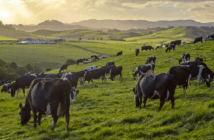By Tony Hunter, food futurist
It’s relatively recently that we’ve recognised how important the microbiome is to human nutrition.
For example, studies at the Weizmann Institute in Israel have shown that our response to food is highly individual. People fed identical food can have the exact opposite blood glucose reaction due to their microbiome. Someone fed a banana, which common sense tells us is good for us, can spike blood glucose in one person but not the next. Similarly, with something like biscuits. This illustrates how important our microbiome is to our health as such spikes are a pre-diabetic indicator.
Many of you will be familiar with the US Food and Drug Administration GRAS (Generally Recognised As Safe) classification of ingredients. However, these ingredients are actually GRAS for the human metabolism, not necessarily for our microbiome.
A good illustration of the potential of this difference is a study in Nature Microbiology from the Norwegian University of Life Sciences and University of Michigan. This study showed that the common additive E415, xanthan Gum, is not quite what it seems. When it was approved in 1968 it was considered that it passed unchanged through the human body. Now, over 50 years later, we find that it is indeed metabolised, not directly by humans, but by our microbiome. Indications are that this is an evolution of our microbiome as it’s only those consuming a western diet whose microbiome can metabolise xanthan gum. A similar evolution of our microbiome to metabolise seaweed components agarose and porphyran was recently demonstrated by a study in Cell Host & Microbe by University of Michigan researchers.
What other common ingredients considered GRAS have unknown effects on our microbiome or have developed an effect due to evolutionary pressures? What if an ingredient enriches for a ‘bad’ microorganism or kills a ‘good’ one and what might be the health or disease effects?
So, my question is how many ingredients which are GRAS for humans are GRAS for our microbiome? Given the importance of a healthy microbiome to human health maybe it’s a good idea to find out.
Tony Hunter is a global futurist, food scientist, speaker, and foresight strategy consultant. He consults and speaks globally, using his distinctive combination of scientific qualifications, business experience, and detailed understanding of exponential food technologies to deliver a unique perspective on the future of food.





























































































